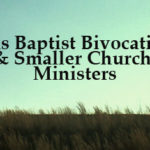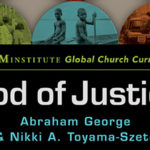WACO—A pair of Old Testament psalms teach people of faith to picture God as an oasis in the midst of life’s deserts, a visiting preaching professor told pastors gathered at Baylor University’s Truett Theological Seminary.
 Robert Smith Jr.Robert Smith Jr., professor of Christian preaching at Samford University’s Beeson Divinity School, focused on Psalms 42 and 43 in his messages to the Truett Seminary’s Winter Pastors’ School.
Robert Smith Jr.Robert Smith Jr., professor of Christian preaching at Samford University’s Beeson Divinity School, focused on Psalms 42 and 43 in his messages to the Truett Seminary’s Winter Pastors’ School.
First, Smith made his point based on scientific principles. He noted water exists in three states—solid, liquid and gas. Water may freeze or turn to steam, but it remains capable of returning to its liquid form.
“All nature has this law that all matter returns back to its original state,” he said.
The principle applies spiritually, he insisted. God has created each individual with a God-sized hole inside—a void that can be filled only by God, Smith said. But people try to fill the hole with poor substitutes.
“Everyone who goes to a brothel is trying to find God,” he said. “Everyone who puts a needle in his or her vein tries to find God. Every person who tries to find fulfillment in a career, a profession or in a relationship is trying to find God.”
Soul’s longing for God
But no substitute can fulfill the soul’s longing for God, he asserted.
“All matter must return back to its natural state. That natural source is God himself. That is why God is our oasis,” he said.
Sign up for our weekly edition and get all our headlines in your inbox on Thursdays
Smith described an oasis as a subterranean stream—often unseen—beneath a patch of vegetation that exists in a desert. The stream feeds the vegetation, keeps it green and makes for a picturesque paradise—even in the midst of dry land.
As a fertile area in a desert region, an oasis represents a paradox—an idea that seems self-contradictory but expresses truth, he explained.
Smith referred to scriptural examples of paradoxes: To find life, one has to lose it. To be first, one has to be last. To be exalted, one has to be humbled. To be great, one must first be the least.
Christians live in a paradox
Christians should recognize they live in paradox, like an oasis, he insisted.
“How can we have laughter in the midst of lamentation, feasting in the midst of fasting, life in the midst of death and joy in the midst of sorrow?” he asked. “It’s not because we are isolated, but because we are insulated. There is a subterranean stream within us, an oasis, we cannot explain. There is something within. Therefore, God wants us to be personal physical paradoxes.”
In Psalms 42:5, 42:11 and 43:5, the psalmist repeatedly ponders why his soul is so downcast, but then immediately commands it to hope in God and to praise his name in the midst of turmoil, Smith noted. The psalmist knew God as the ultimate oasis and was able to put hope in God in the midst of suffering, he said.
“All three of these refrains serve as the stitching that unite the fabric of both of these psalms,” he said.
The psalmist’s Rock
Their subject makes the psalms powerful, Smith said. Although the psalmist speaks much of himself in the two psalms, he primarily focuses on someone else. He emphasizes hoping in the God of salvation, not himself. In Psalm 42, God commands his steadfast love, and God is referred to as the psalmist’s rock.
“The emphasis is not on the soul, but it is on God,” he said. “It’s God that is our oasis. It’s not ourselves. It’s not how many members we have. It’s not our palace. It’s God. It is an invitation to come to God. …This psalm brings us into contact with who we really are and what we experience as we walk along the journey.”
Recognition of God as an oasis should bring hope and joy to followers of Christ, especially in the midst of life’s trials and tribulations, Smith insisted. After all, he said, only one Oasis in the world brings true refreshment and peace.
“He is not (just) an oasis,” he said. “He is the Oasis, and he can refresh you in a thirsty and dry land.














We seek to connect God’s story and God’s people around the world. To learn more about God’s story, click here.
Send comments and feedback to Eric Black, our editor. For comments to be published, please specify “letter to the editor.” Maximum length for publication is 300 words.